“Something respectable” with room for fun
(porträtiert im Jahr 2022)
Dagmar Möbius
Andreas Wilde has a Diplom degree in Architecture. His studies at TUD laid the foundations for his company that creates innovative board games that integrate apps into gameplay. At first glance, you may believe this has nothing to do with architecture. But if you look a little closer, the connection will be more clear. As a designer, it’s important to him to create games that have a deeper meaning beneath the fun.
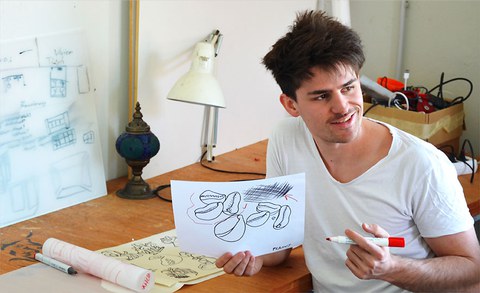
Andreas Wilde learned Geometry with the help of laser-cut and thread-wound models.
“Something creative, and as far from home as possible,” was what Andreas Wilde, originally from Freiburg, had in mind when choosing what and where to study. An Art degree in London and a Civil Engineering program made it to his shortlist. But ultimately, he opted for the Architecture degree program at TU Dresden. “It’s the most creative profession that’s also seen as ‘something respectable,’” grins the now 31-year-old. “Good prospects and a beautiful city,” he summarizes, looking back on his choice of where to study. What’s more: “The low rent prices also sounded appealing.”
Room for trial and error
Andreas Wilde was a student not too long ago, from 2011 to 2018. He particularly appreciated the project-oriented nature of his program and that he was able to learn a lot. “There was room for trial and error,” he says. He was able to contribute to projects while still studying and he has fond memories of this time. His eureka moment came when he realized, “My ideas carry weight.” He hopes all university students will have this moment. He enjoyed taking advantage of the studium generale, which enables a glimpse into other degree programs. “Lectures on Rembrandt or politics left an impression on me, just as much as the architecture lectures did,” he says.
Skills applicable to many areas
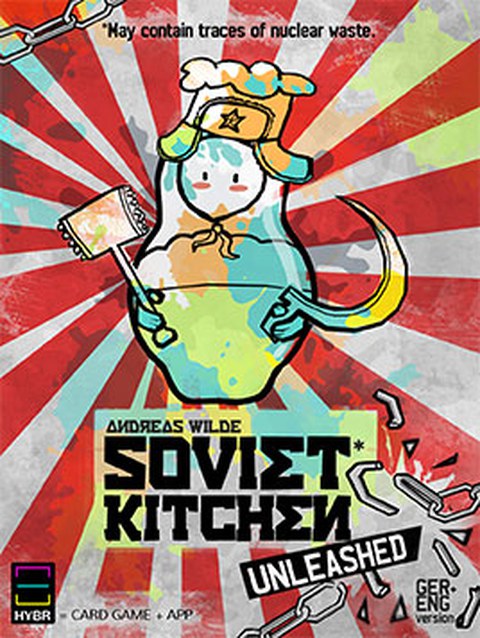
"Soviet Kitchen" is the name of their first game. It involves mixing colors - with physical and social moments. It has been sold in eight countries so far.
Professor Daniel Lordick, who teaches Math for architecture students, taught Andreas Wilde spatial drawing. He learned Geometry with the help of laser-cut and thread-wound models, which would come in handy later. Parametric design and other skills he acquired are also still useful to him today. He wrote his Diplom thesis within the scope of the major EU Horizon project U_CODE – Urban Collective Design Environment. What was his topic? Playgrounds. He focused on urban development and participation in urban planning. His advisors were Dr. Jörg Rainer Noennig and Anja Jannack from Wissensarchitektur – Laboratory of Knowledge Architecture.
As part of his Diplom thesis, Andreas Wilde built a game for architects. “That was very cool, and I felt like I did it on my own initiative,” he says, still pleased today. “Looking back, my studies had a lot to do with it. Architecture is still an interesting program for gaining skills applicable to many areas. And as it turns out, that was fortunate for me.” Andreas Wilde founded several small companies while he was still a student. They all centered around games. Why? “I enjoy being creative. In the world of game creation, about 50 or 60 percent of the work is creative. In architecture, this is significantly less. Alongside drafting, there’s also reviewing, financing and much more,” he explains. He already had success selling games in 2018.
The initiator as part of the team
One year later, he founded the independent game studio HYBR Games. The company develops innovative board games. What sets them apart? “We integrate apps to bring the perks of video games to the gaming table,” explains Andreas Wilde. He is proud of their “genuinely hybrid games, where the apps aren’t just gimmicks.” He was the initiator, but he considers himself part of the team. He met his co-founder Bartłomiej Zalewski, an Electrical Engineering alumnus, not at TU Dresden as you might expect, but in Dresden’s start-up scene. The software specialist originally just wanted to name a game. When they both noticed they wanted the same things, they decided to found the company together. Since then, the team has doubled in size, but not all of them work full time.
This video shows Soviet Kitchen’s color mixer machine: Two players try to make green.
The games, the risk and financing Atlantis
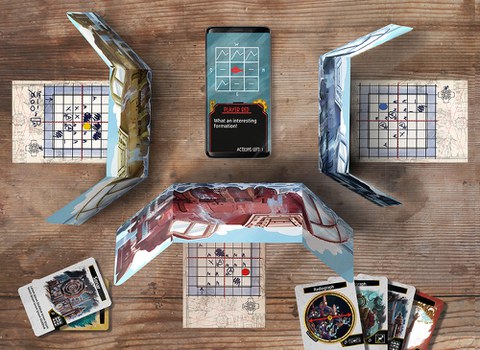
An exclusive preview – Kontakt-online has been granted permission to publish the cover of the new game. "Finding Atlantis" will be released in October 2022.
On the subject of financing: It’s hard to forecast in the creative scene. “If a title isn’t well-received, that’s bad. If we had two flops one right after the other, we would be finished,” says Andreas Wilde. However, the start-up still hasn’t needed any investors to date. In addition to subsidies and several start-up grants, the game developers are in close contact with their fans, involving them in beta tests, for example. So far, their customers have provided funding for the products in two crowd-funding campaigns. “We’ll do that again,” he confirms. Their latest game, “Finding Atlantis,” is planned for release in October 2022. As the name suggests, the aim of the game is to find Atlantis. The app knows where Atlantis is, but the players don’t know. “This deduction game is a bit like battleship,” explains Andreas Wilde.
Concocting fun every week
HYBR Games is now open for investments. The reason is simple: “If we develop more games, it balances out the risk.” Andreas Wilde spends about half of a typical work week on administrative tasks: management, strategy, meetings with programmers, communication. He spends the other half immersed in his games: painting pictures, taking photographs, picking out colors – and playing. He meets with his team once per week to play games. This is known as “play testing” and actually has a serious purpose. Before a game can be sold, it must have been played 100 to 1,000 times. “Our process for concocting fun” is how Andreas Wilde describes this phase. “There shouldn’t be any uncertainties in the finished game.”
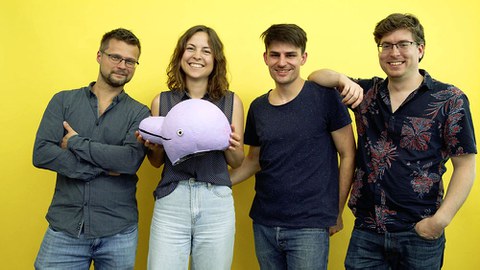
The team from left to right: Bartłomiej Zalewski, Milena Meißner, Andreas Wilde and Jonas Kopcsek.
A competition-free home for start-ups
Andreas Wilde is thankful that his studies equipped him with the skills he needs for his work now: “About half of my classes trained me to become a game designer.” Andreas Wilde is still in contact with the “Laboratory of Knowledge Architecture” at TUD and can imagine working with them again on augmented reality (AR), gamification or image recognition. His team is also open to research projects. “We’re already using image analysis now, and not a lot of people are doing that.” Currently, an intern from TUD is working with the team
The Freiburg native has found a new home for himself and his multimedia start-up. “There’s not as much of a power struggle in Dresden compared to Berlin, for example. There are fewer people trying to butt in here and we stand out more,” he laughs.
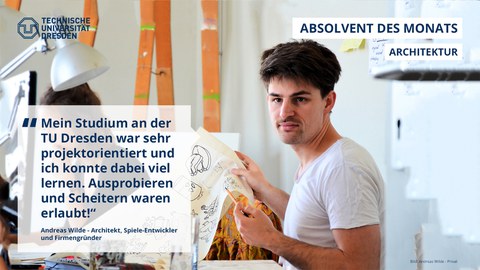
Andreas Wilde ist Absolvent des Monats Oktober 2022.
Contact:
Andreas Wilde, Diplom in Architecture
Game Designer, Creative Manager
HYBR Games GmbH
Jordanstr. 2
01099 Dresden
Tel.: +49 176 47762052
Email
Web
